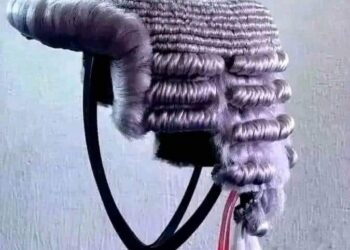A Lagos based lawyer, Lawrence Nnoli has approached a Federal high court sitting in Lagos with a request for an order of mandamus compelling President Muhammadu Buhari to forward to the senate the names of Supreme Court justice-nominees sent to him by the National Judicial Council for confirmation.
The lawyer accompanied the originating summon with an application for leave to pursue the mandamus order against Buhari.
Mandamus is a judicial remedy in the form of an order from a court to any government, subordinate court, corporation, or public authority, to do (or forbear from doing) some specific act which that body is obliged under law to do (or refrain from doing), and which is in the nature of public duty, and in certain cases one of a statutory duty.
President Buhari is required under the 1999 Constitution to forward names sent to him by NJC to the senate but in the instant case, has refused in the last nine months to perform the public duty without giving any reason known to law.
The on-going legal move is to compel him perform his duty without any further delay.
In the originating motion, other persons joined in the suit are the National Judicial Council, the Chief Justice of Nigeria and the President of the Senate.
According to Nnoli, the names of the person’s recommended for appointment in the Supreme Court bench are Justices Adamu Jauro, Emmanuel A. Agim, C. Oseji and Helen M. Ogunwumiju, all of the Court of Appeal
The motion was brought exparte on the following grounds:
That the President of the Federal Republic of Nigeria has failed and neglected to appoint as Justices of the Supreme Court of Nigeria, the persons recommended to him by the NJC since October 2019
That the President of the Federal Republic of Nigeria had also failed and neglected to forward to the Nigerian Senate the names of persons received by him from the NJC who were recommended for appointment as Justices of the Supreme Court of Nigeria
That Buhari’s action constitutes serious breach to section 231(2) of the constitution of the Federal Republic of Nigeria, 1999 (as amended)
That Buhari’s inaction currently poses a grave danger to the cause and course of justice in Nigeria, especially at the Supreme Court as the inaction of Buhari constitutes a major factor for delayed justice as the Supreme Court
That the continued delay of Buhari in carrying out the statutory duties of appointing as Supreme Court Justices persons already recommended to him by NJC poses a risk to the peace and progress as Nigerian citizens’ confidence in the Supreme Court towards dispensing justice in a timely manner may be eroded owing to insufficient number of Justices of the Supreme Court available to dispense justice in a timely manner.”
To establish his interest in the case, Nnoli in a 21 paragraph- affidavit in support of the motion, said he was called and admitted as Barrister and Solicitor of the Supreme Court of Nigeria” and has paid his Practicing Fee for the year 2020 adding that he is also a member of the Nigerian Bar Association (NBA), Lagos Branch and has paid his Branch dues.
Nnoli said he is a practicing lawyer with office in Lagos and is “his solemn responsibility as an active member of the Nigerian Bar Association to advance the interest and progress of Justice in Nigeria” including guarding against executive lawlessness and recklessness
In his written address in support of the Motion, Nnoli argued that he has sufficient interest in the matter in line with the requirement of Order 34 (3)4 of the Federal High Court (Civil) Procedure Rules, 2019 which provides that:
“The judge shall not grant leave unless he considers that the applicant has sufficient interest in the matter to which the application relates.”
On what sufficient interest entails, he relied on the case of Ezeagu Local Government v Ufuanya (1996)7 NWLR (Pt. 459) 226 at page 231 paragraphs F-H where the court held that:
“Sufficient interest is an adequate interest in the res or subject matter of the litigation. This could be tangible or intangible.
“The internet could be pecuniary or any other form which is borne out from the relief or reliefs of the litigation.
“What is sufficient interest in law is neither an exclusive matter of law alone nor an exclusive matter of fact alone; but one of mixed law and fact to be determined in the light of the peculiar circumstances of the matter.
“In determining the sufficiency of the interest, the court must examine the totality of the relief or reliefs sought and see whether relief or reliefs sought and see whether the facts relied upon by the applicant in the affidavit can be accommodated by the relief or reliefs sought.”
He also cited the case of Dododo v EFCC (2013)1 NWLR (Pt. 1336) 468
The matter is currently awaiting assignment to a judge for the hearing of the ex parte application.




